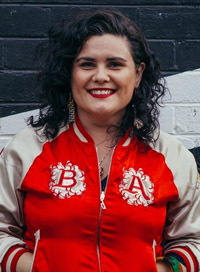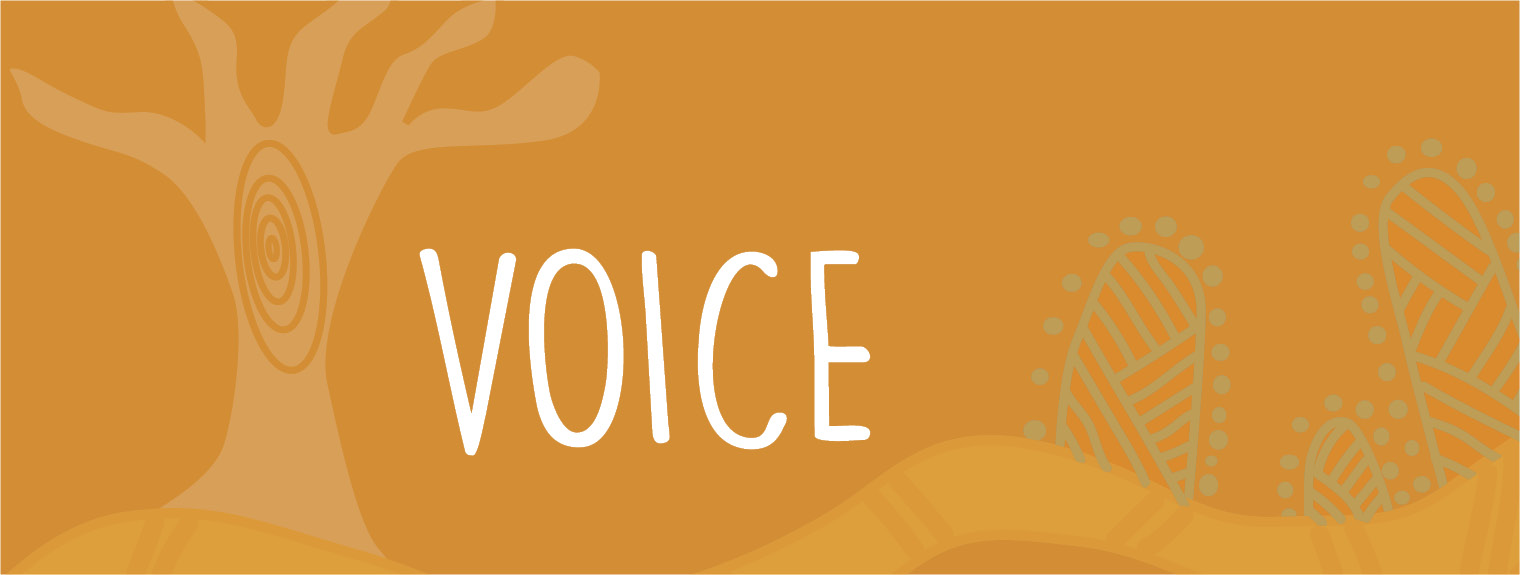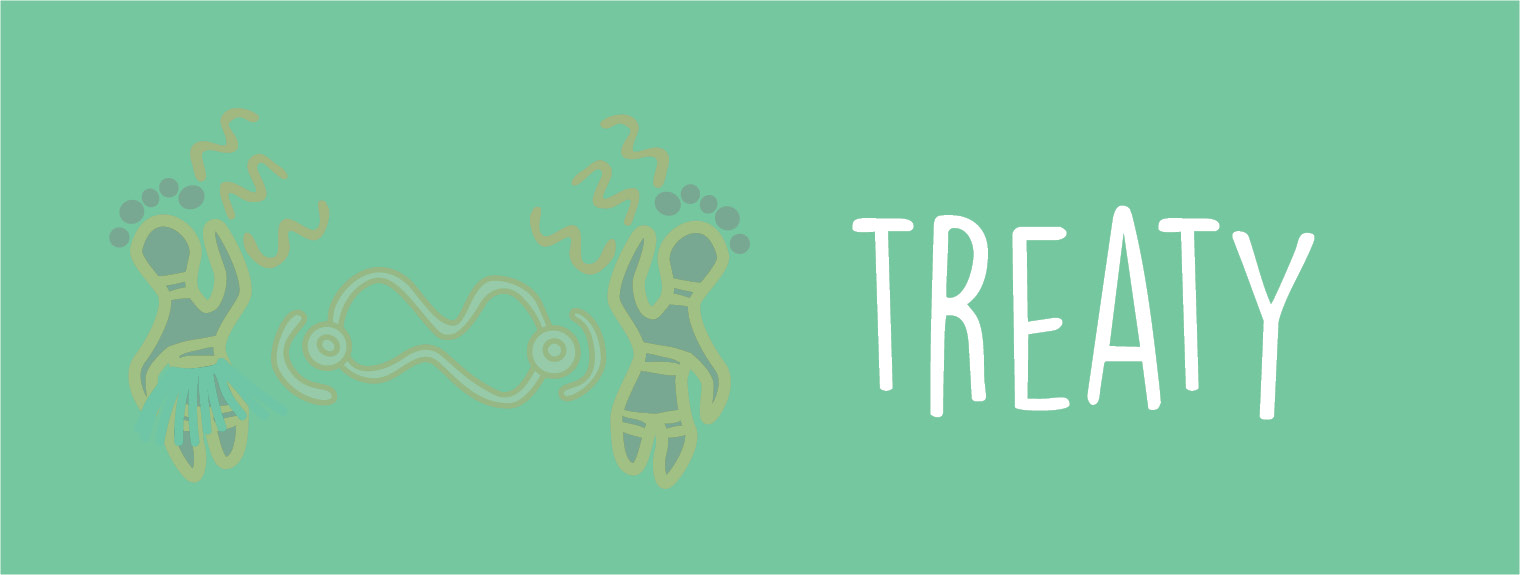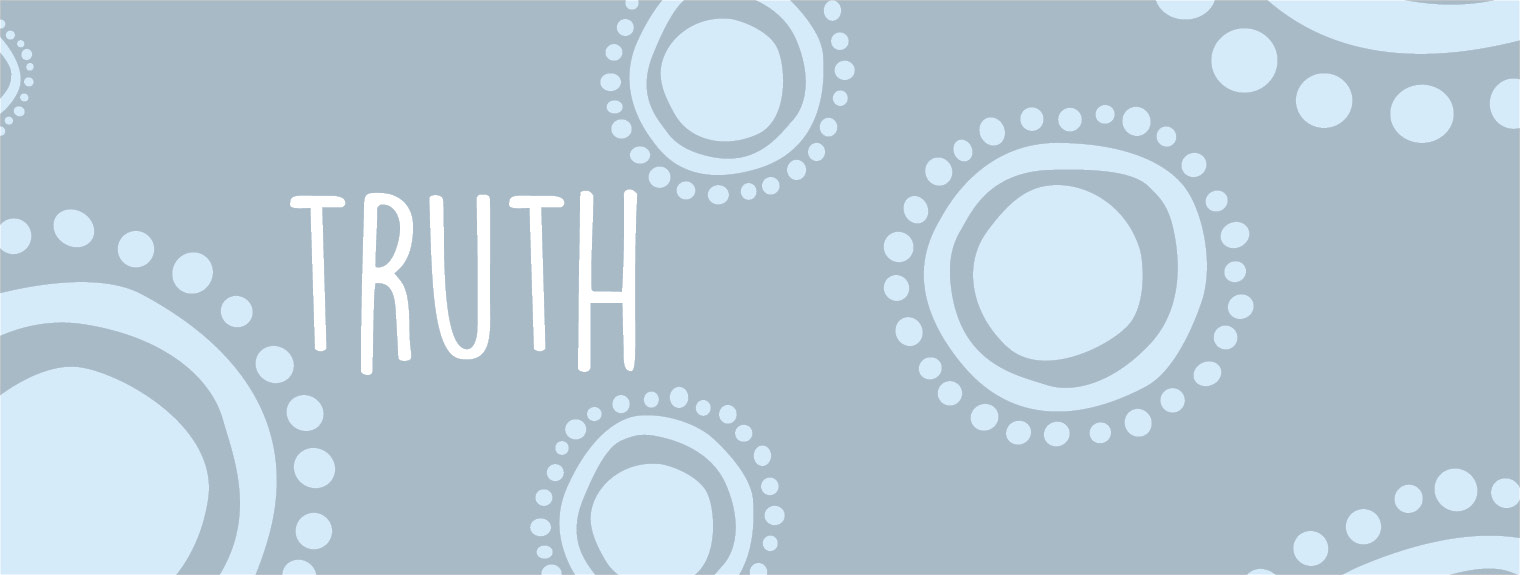Paola Balla is a Wemba Wemba and Gunditjmara woman from the Day and Egan families.

She is a visual artist, curator, speaker and a researcher and lecturer at the Moondani Balluk Academic Unit at Victoria University. As a contemporary visual artist, Paola draws upon her family and identity as a Wemba Wemba and Gunditjmara woman for inspiration. She explores the themes of identity, connectedness, belonging and justice in her artwork.
Deadly Story welcomes Paola as she shares her thoughts on 2019's NAIDOC theme of 'Voice, Treaty, Truth.'


What does it mean for the Aboriginal Community to have a voice in our modern society?
I think it’s really important, because we are so silent in the mainstream. I think it’s also really important because we all know that the majority of non-Aboriginal people in this country don’t know the truth about what happened to us and what’s still happening to us. I think there is some improvement, but when you’re still seeing all white panels discussing Aboriginal people and issues on TV shows watched by millions in this country you know we’ve got a long way still to go.
When you’re still seeing all white panels discussing Aboriginal people and issues on TV shows watched by millions in this country you know we’ve got a long way still to go
Representation is really important, on that bigger level, a more public level. And it’s important for our kids to see our people being heard and speaking up and knowing that their voice is important and not ignored.
On a personal level I think it’s really important for individual people to be heard when they are suffering, when they’re going through trauma and for us to support people going through trauma because you often feel very silenced and having a voice is really important for healing.
It’s really important for individual people to be heard when they are suffering
The problem being heard nationally is that because we are a collective made up of families and clans and mobs and countries from various communities and communities inside communities - because, some of our mobs are queer and some of our mob are transgender and they also feel isolated - and we have young ones and Elders and we aren’t all the same. And even though we are cross generational people as is, we have relationships across generations that most people don’t, it’s still very hard for our diversity to be seen once it gets to a leadership level.
The issue is, because we were invaded - and colonised as cultural people – this white, institutional, non-cultural European approach to organising our lives has been imposed upon us. I think there’s always going to be this tension because our cultural ways and the institutional model will never really match up. The things that we require, Elders councils to be heard and families and clans, how do you ensure that a government model can represent us all? It’s such a hard thing to achieve. It’s like it’s almost always going to be inadequate, I think that’s a challenge.
There’s always going to be this tension because our cultural ways and the institutional model will never really match up
In communities and family groups it’s so important for people’s voices to be heard, in families it’s important that women and kids aren’t silenced and that they’re heard. Valuing each other’s voices and being respectful is so important.
For me it’s a real passion because so many kids grow up experiencing transgenerational trauma and immediate trauma so you want to talk about it but you fear speaking out because there’s so much risk associated with it. And abusive people and abusive systems work by silencing people who are more vulnerable than they are.
I grew up craving to be heard which is why I think I’ve become so passionate about speaking out publicly and making art and doing public things, because I think when you crave being heard and then all of a sudden there are people listening to you it’s like, “wow, what do I do now with this opportunity” - and then it becomes exhausting and you also want other people in the community to be heard.
I grew up craving to be heard which is why I think I’ve become so passionate about speaking out publicly and making art and doing public things
What are your ideas for how the Aboriginal voice in this country can be given a greater platform?
Because I work across the arts and education, both of them require a lot of public speaking, so the way I try to make sure that as many other mob are heard as possible – especially women, that’s really important to me because I focus my work around Matriarchy – what I and the rest of us at Moondani Balluk try to do, is invite in other community people to come and give guest talks and we share their work. That’s one really important way, it shows non-Aboriginal students (and Aboriginal students) that we value community voices. It’s not always just people who have gotten to a certain level of fame or are known for their work, it’s valuing community people and making sure they have a chance to be heard.
I try to make sure that as many other mob are heard as possible – especially women
It’s also reminding everyone of those that have gone before us who have passed and don’t have their voice anymore, to make sure that people aren’t forgotten and that their contributions aren’t forgotten. I think it’s important because we are grieving those people and we experience so many losses, we then find it hard to talk about them because it brings up the pain of them not being around anymore. The risk in that can be that if we don’t talk about them, our young ones could miss out on experiencing who they were. Because our mob die way too young and far too often, it’s such a common experience. How do we move through grieving and still talk about people, so their contributions aren’t forgotten? If our women got to live out their full lives, they would be more recognised, in the same way white people are after they’ve spent a lifetime doing something. We are so busy dealing with the losses, supporting family and community. It’s a cycle that’s exhausting. I think reminding non-Aboriginal of how many contributions our people make is really important, especially the ones we don’t hear about.
How do we move through grieving and still talk about people, so their contributions aren’t forgotten?
In Australia you have to be pretty exceptional in sports, or film or music to get seen by a white audience and be remembered. You have to be really exceptional.
In the arts, I try to make sure that every public speaking opportunity I get, I try to talk about the statistics that we’re dealing with, and I know that I get people who start switching off to a little bit but I start saying to them, you need to know, I’m talking about Aboriginal women because you need to know that Aboriginal women are the fastest incarcerated group in this country right now. Our kids are going into out-of-home care at a rate faster (some people say) than during the Stolen Generations.
I try to make sure that every public speaking opportunity I get, I try to talk about the statistics that we’re dealing with
It’s reminding people in every public platform I get, that we are still experiencing colonial violence and the violence of the settler state, the violence of non-Aboriginal Australia. Aboriginal women, yes, we are very strong. And we are amazing. But we are also vulnerable. And the more people focus on how strong we are and how much we overcome, the more we ignore how much at risk we are. I keep asking – What is so threatening about Aboriginal women that we need to be put in jail and have our kids taken away from us? It really bothers me that on a larger scale that’s not being dealt with.
We are still experiencing colonial violence and the violence of the settler state, the violence of non-Aboriginal Australia
I always speak about very difficult things like that, but I also invite in other Aboriginal women as much as possible to share platforms I'm invited to with me. I write a lot about other Aboriginal women and their work in the publications I get in, so that’s one way of documenting and making it permanent. Once something is online it’s there to be shared, forever. And the other thing I love doing is saying no to requests but saying you should invite another Aboriginal woman. Part of the responsibility of having a platform is not taking all the opportunities. Because white people get very comfortable going to the same people every time.


What does treaty mean to you?
In theory, I’d be so happy if our peoples were in a proper treaty process with the Australian government, with local government at a council level and with state government if it was fully representative, between all clan groups, family groups, language groups. That would be the ideal. It would mean proper full rights, as Indigenous people, like in the UN Charter on the Rights of Indigenous People. It would live out all of those principles.
I’d be so happy if our peoples were in a proper treaty process with the Australian government...if it was fully representative, between all clan groups, family groups, language groups
I feel frustrated with the current Treaty process with the Victorian Government as it is, because from what I understand in trying to keep up with the process, my family group, Wemba Wemba is one of the groups that’s left out. It’s not one of the 12 that’s included currently for the pre-selected seats. It only includes groups that are a Registered Aboriginal Party (RAP) and our mob, as Wemba Wemba people, we’re not a RAP.
The thing with our mob too is that there’s Wemba Wemba and Wamba Wamba people and there’s people say that we’re the one mob but there are 2 different pronunciations, but I respect my family and my great grandmother as one of the last full speakers of Wemba Wemba language, Nanny Nancy Day and her brother Stanley Day. They were recorded by Louise Hercus who was a linguist and she published a dictionary on our language based on the work she did with our family. And so whenever anybody else in this state uses our language or Country, that comes from my great grandmother and my great uncle. And so we say Wemba Wemba, we always have and always will, that’s our language group. And so you know, to be not a part of that, we don’t know if it’s because, colonially, we are in NSW. But as Wemba people we have lived in around areas like Deniliquin and Echuca - my great grandmother and grandfather had to leave Moonaculla mission which was in NSW and they moved over the border because of the cruel oppression and punishments by the mission manager in 1941. So because of state laws we had to leave there and ended up in Echuca which is Yorta Yorta Country.
Whenever anybody else in this state uses our language or Country, that comes from my great grandmother and my great uncle
I think just seeing this process and how many people are upset by it and seeing that it’s not quite where it should be. You can see what the Commission is trying to achieve by the advertising and promoting it, but currently as it is, I don’t want to participate in it. It worries me that I’ve got to tell my kids, and one day my grandkids, that they weren’t a part of the first treaty in Victoria because we weren’t a recognised Aboriginal party. You’re going to tell us that our language and people that have been here since time immemorial like all the other mobs isn’t as real because it’s not a recognised party by a government organisation, that really worries me. If you have a group of Koorie kids in front of you and some of those kids are Wemba Wemba and you’re going to have to tell them that they aren’t in it, their voice isn't going to be heard or more importantly their Elders and families aren’t. How are they meant to understand that? If you really want to talk to kids about Treaty wouldn’t you want to tell them that all of our language groups will be included? Like on a Victorian Aboriginal language map, Wemba Wemba people are there, why aren’t we in the Treaty process?
So that’s what I was saying in the first question, that culture and governmental processes don’t necessarily fit and ultimately we’re not seeing all the voices included. And I don’t think it could be a real treaty unless it has all of us. I don’t understand why it doesn’t include all of us.
Culture and governmental processes don’t necessarily fit
I think it would’ve been wonderful if the Treaty processes had been done across all the different mobs across the state and a couple of big state-wide gatherings where we could have had big circles of Elders sit down and be heard. To make sure that as much as possible, every mob is consulted.
All the Mob that are feeling disenfranchised by this process are pointing out, we know it can be done. Why isn’t it being done?
In telling the truth sometimes it means questioning people and questioning each other. But that’s also a part of our culture. We all learn to get ripped, that’s part of culture. And to stop and say “maybe we’ve got this wrong, maybe we should start again.” I don’t get what the rush is, we’ve been surviving this long, why don’t we slow it down and start again.
There is still so much great potential for it to have an enormous impact on our lives and wellbeing.
What aspects do you think should be included in the conversation about treaty?
The ideal could include so many things, full and proper education being instilled in schools, it could mean reparations for Stolen Generations, people having full and free access to Country to do cultural activities on, to look after Country, to raise your kids on Country. All of that.


What is a fact or truth about Aboriginal history and current experience that you think should be widely known?
The knowledge that we built structures, that we had roads and pathways and villages and that we lived in one place. Because I think that notion of us not being human enough, being nomadic and going “walkabout” still persists. I heard that term used on telly not that long ago, they were talking about a whitefella but we know that the term comes from describing us, that we were nomadic and didn’t own anything.
The knowledge that we built structures, that we had roads and pathways and villages
That’s something I would really love people to learn more about. The knowledge that we actually cultivated the Country, we did things deliberately. Like the Gunditjmara eel traps, farming, gardening and the cultivating that women did like collecting yam daisies. The fact that we wove baskets to store things in because we collected things. We collected them and treated them in certain ways. We grew things. We made bread and cakes and damper. We did things that civilised society did; we were civilised. People forget that we are still dealing with that propaganda and lies that we weren’t real people here.
I love seeing how many Aboriginal women, especially Koorie women, keep weaving. There’s something in that for me because I think, what did we need these baskets for? We kept things in them, we had things. Just like a woman has her dilly-bags now, we have our handbags now. We were real people and the idea that we weren’t real still persists. I think that’s why we are still disrespected continually, why there’s still so much racism and hatred towards us, because we’re not really seen as humans.
I love seeing how many Aboriginal women, especially Koorie women, keep weaving
Not being real enough happens to mob that are fair skinned. That our kids still deal with that and have their Aboriginality questioned. I just don’t think the rest of the country realises how far back it is that our women were raped and that our appearance started changing, over a couple of hundred years ago. Like this isn’t a recent thing that we’re somehow less Aboriginal or that we’re not really Aboriginal. Plus our mob was mixing in with other visitors from hundreds of years ago, the Portuguese, Makassans, Indonesians. We were mixing with other mobs way before the British got here. We will always be who we are, even if our appearance changes it doesn’t make us less of a blackfella. All the myth making is part of still trying to make us go away.
Even if our appearance changes it doesn’t make us less of a blackfella.
What do you think needs to be done to make these truths known?
Working in education and the arts, I’ve been teaching at a tertiary level at uni now since 2001 – I graduated as a teacher in 2001 and started teaching in 2002, what’s that 17 years or something? – I've consistently found over that time, let alone all the Elders that have gone before us that have taught people, that the majority of uni students and the majority of people that I meet in this country, non-Aboriginal, have probably a grade 3 - 4 primary school level education about Aboriginal Australia, if that. Some might be a little bit better – depending on what school they went to, if they had Koorie educators and if the local community was listened to in that school.
But honestly, I do surveys with groups that I’ve been teaching over the last 17 years, everyone from primary school, high school and university level, almost every single group I meet has said that they never received an adequate education on the history of Aboriginal Australia in this country. So what happens as a uni educator, usually with our first years, it is the first time in their life that they’ve ever encountered an Aboriginal educator, teacher or lecturer, the first time they’ve undertaken a compulsory Aboriginal subject and that’s only if they’re taking particular courses, like education. The other times they’re meeting us usually is because they are taking the subject as an elective, so they are making a decision voluntarily that they want to know more.
Almost every single group I meet has said that they never received an adequate education on the history of Aboriginal Australia in this country
They are way behind our Aboriginal and Torres Strait Islander students because they just don’t know and they all tell you the same thing, that they never got taught this at school. So what has to happen is that it must be from early childhood, primary and high school education. There must be compulsory Indigenous subjects. I know that the national curriculum has requirements that Indigenous perspectives be taught but I just don’t think they’re good enough or implemented well enough, and the level of institutional racism from government and schools means that Australians don’t get a good enough education. It’s generationally churning people out to be quite ignorant and racist over and over again.
I know that the national curriculum has requirements that Indigenous perspectives be taught but I just don’t think they’re good enough or implemented well enough
I think the most education people are getting is actually from Aboriginal storytellers, Elders, artists, community members, actors, filmmakers. People end up getting more education outside of the education system on us. Because we’re such good storytellers. It should be compulsory.
There needs to be anti-racism training throughout primary school and high school, they have to teach kids to not be racist in this country. There’s an historical legacy of being racist that they all keep passing on.
There needs to be anti-racism training throughout primary school and high school
It all just requires telling the truth. And it doesn’t need to be tied to a movement, it just needs to be. For the purpose of telling honest, factual history. Countries that deny history and the truth are countries that commit genocide and atrocious acts against people and denigrate human rights. And that’s what keeps happening in this country. I think part of the problem is that truth telling keeps getting caught up in movements like Reconciliation and Recognise. Just educate people. Move it away from a political agenda and tell the truth for education purposes and let people make up their own mind. Not even telling people what to think or what opinion to have but educate them and let them be informed about the history in this country.
